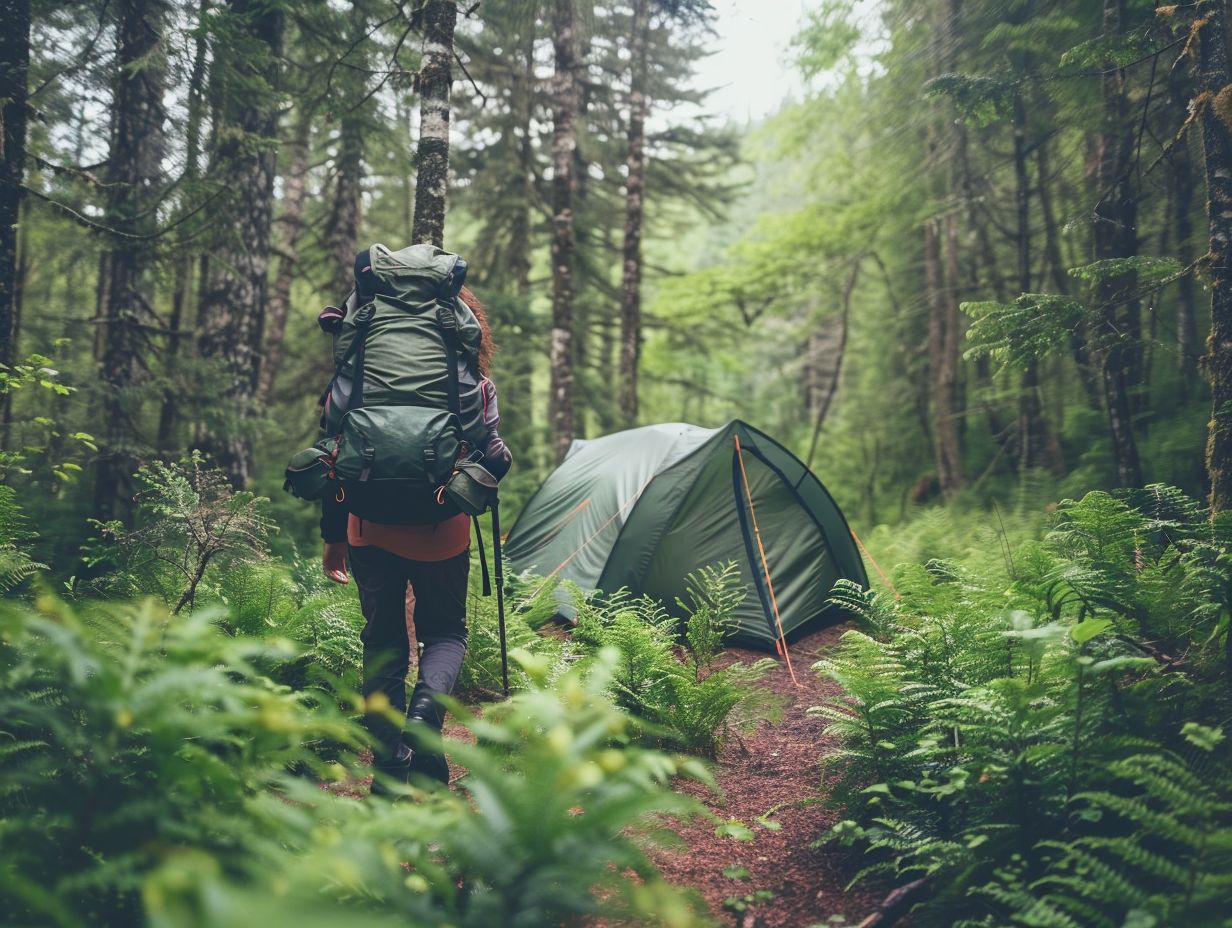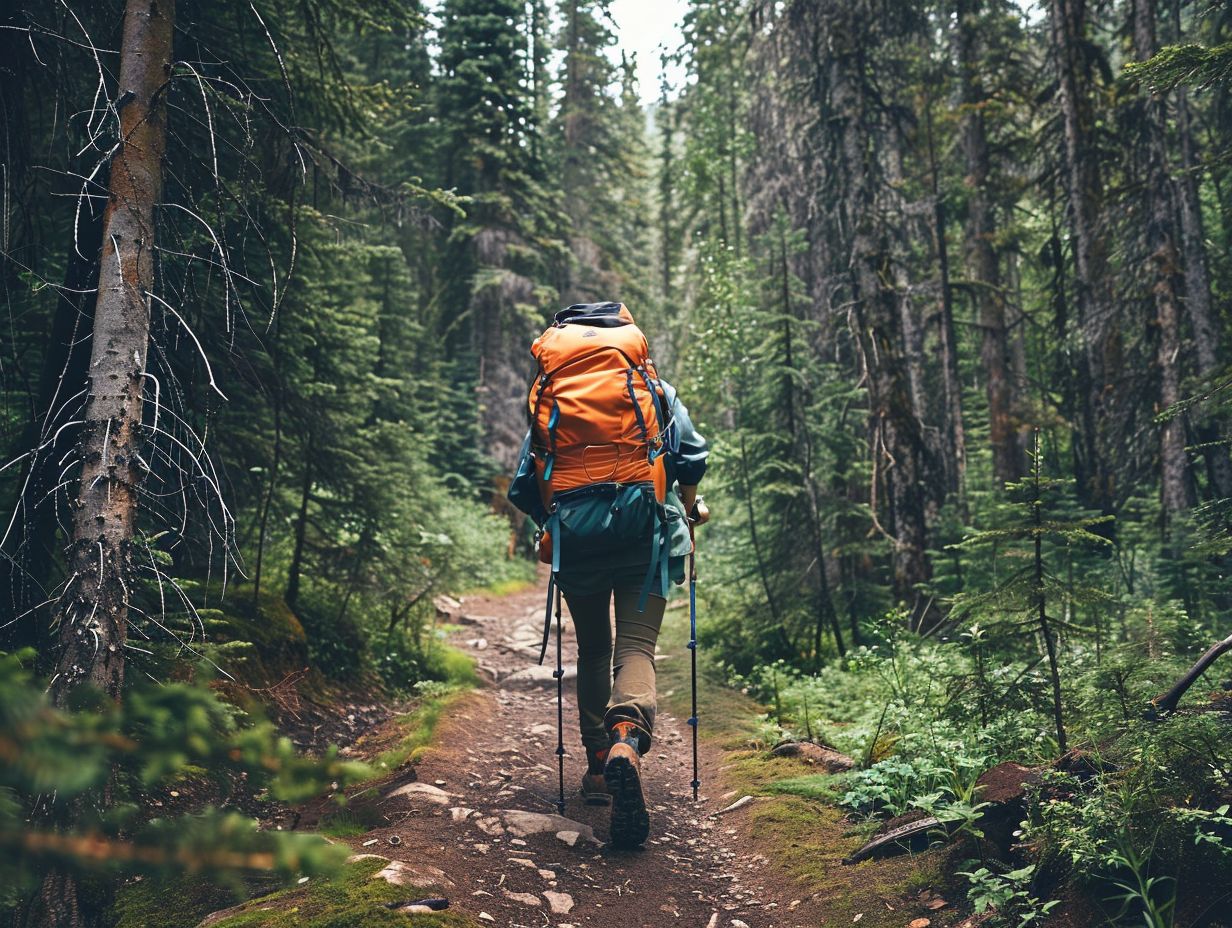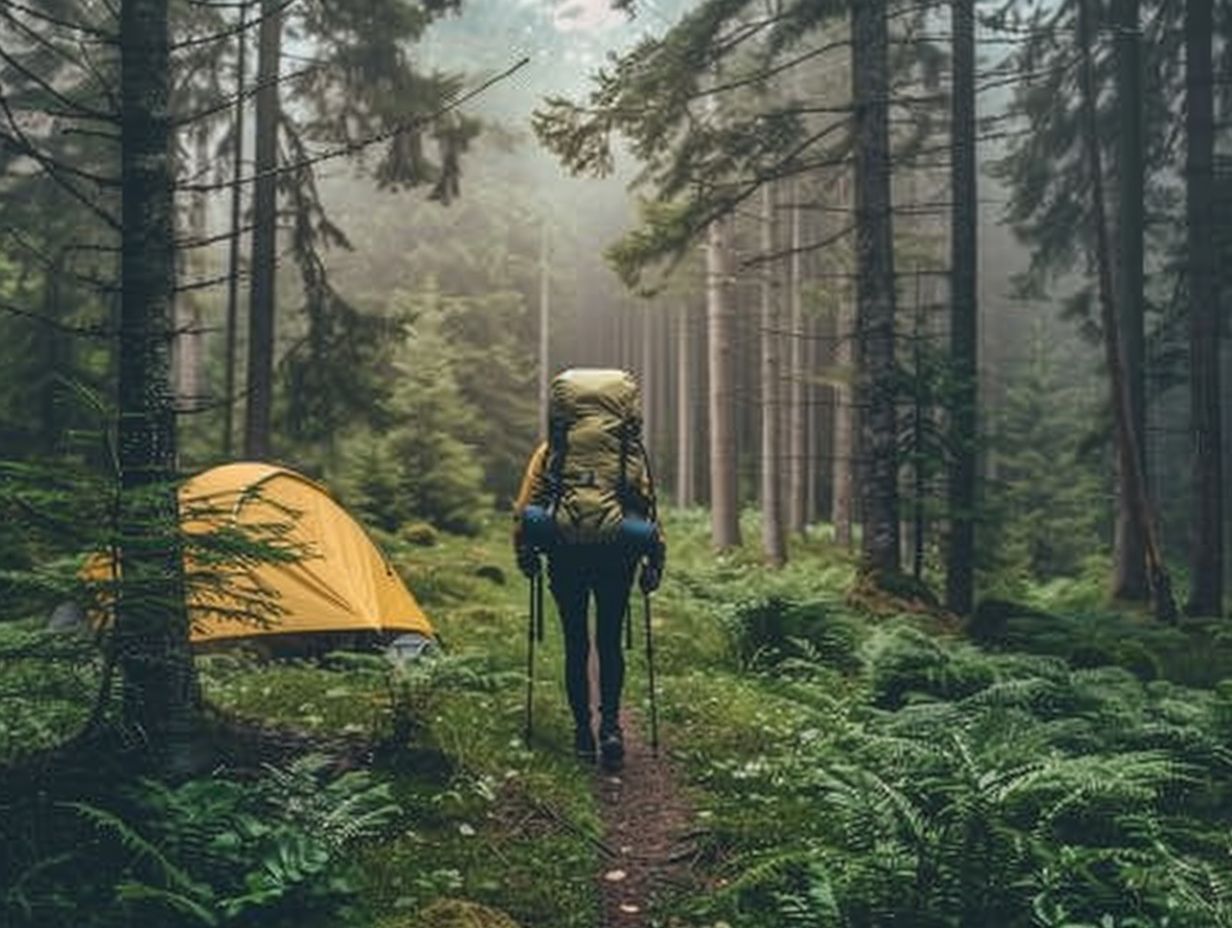If you are a nature lover seeking to reduce your environmental impact while camping and travelling, the concept of minimal impact is worth exploring. This approach not only benefits the environment but also contributes to your personal experience.
By embracing the principles and practices associated with minimising impact, you can ensure responsible travel. From selecting eco-friendly destinations to managing waste responsibly and engaging with local communities, you can enjoy the outdoors while leaving a positive footprint in your wake.
Key Takeaways:

- Camping and traveling with minimal impact means reducing your negative impact on the environment and local communities.
- Minimal impact camping and travel not only benefits the environment, but also has personal benefits such as promoting mindfulness and a deeper connection with nature.
- To plan for a minimal impact trip, carefully choose a destination and prepare by following Leave No Trace principles and other guidelines for responsible travel.
Understanding Minimal Impact Camping and Travel
Understanding Minimal Impact Camping and Travel is crucial for you as an outdoor enthusiast who values preserving the natural beauty of the environment you explore. It entails being mindful of the impact you have on nature and wildlife while relishing the wonders of the great outdoors.
By practising minimal impact camping and travel, you can play a part in conserving delicate ecosystems and habitats. By incorporating eco-friendly and sustainable practices, such as adhering to Leave No Trace principles, you can help reduce the negative impacts of human presence in natural areas.
These principles advocate for leaving nature undisturbed, minimising waste generation, and showing respect for wildlife by observing them from a safe distance.
By embracing these values, you not only protect the environment for future generations but also cultivate a deeper appreciation for the interconnectedness of all living beings.
What is Minimal Impact?
The concept of Minimal Impact involves camping and travelling in a manner that minimises negative impacts on the environment, wildlife, and natural ecosystems. It entails showing respect for the delicate balance of nature and ensuring that no evidence of human presence is left behind.
By following the principles of Minimal Impact camping, you can play a role in preserving ecological values. This approach emphasises the reduction of waste generation, prevention of damage to vegetation, and consideration for wildlife habitats.
For instance, when camping, you can choose biodegradable products, adopt responsible waste disposal practices, and select designated camping areas to minimise disruption to local flora and fauna.
By reducing your ecological footprint, you can contribute to the protection of natural environments, thereby ensuring that future generations can also enjoy and appreciate the beauty of pristine wilderness.
Benefits of Minimal Impact Camping and Travel
Engaging in Minimal Impact Camping and Travel not only benefits the environment and wildlife but also offers you personal rewards. By adopting eco-friendly and sustainable practices whilst exploring nature, you can contribute to the preservation of our natural resources.
This mindful approach to outdoor adventures not only reduces your carbon footprint but also helps in maintaining the delicate balance of ecosystems.
Through conscious choices like using biodegradable products, minimising waste, and respecting wildlife habitats, you can actively protect and conserve the environment you are so eager to explore.
Embracing minimal impact camping allows you to connect on a deeper level with nature, fostering a sense of appreciation for the beauty and diversity of our planet whilst ensuring that these experiences remain accessible for generations to come.
Environmental and Personal Benefits
The Environmental and Personal Benefits of Minimal Impact Camping and Travel are significant. By reducing waste, respecting wildlife habitats, and adopting sustainable practices, you can contribute to the conservation of natural ecosystems and enjoy immersive experiences in pristine wilderness.
This form of eco-friendly camping not only helps preserve the delicate balance of nature but also plays a vital role in safeguarding the wildlife that inhabits these areas.
By practising Leave No Trace principles and treading lightly on the land, you can help protect fragile ecosystems, minimise soil erosion, and reduce pollution in water sources.
Minimising human impact allows you to forge a deeper connection with the environment, immersing yourself in the beauty of the natural world and fostering a sense of stewardship for future generations.
Principles of Minimal Impact

The Principles of Minimal Impact Camping are guided by the core tenets of Leave No Trace, emphasizing the importance of respecting the environment, wildlife, and fellow campers. By following these principles and adhering to camping rules, you can minimise your impact on natural spaces.
This approach involves practices such as packing out all rubbish, using designated campsites, and avoiding damage to vegetation. It is essential to tidy up after yourself, leaving no litter behind, and to treat wildlife with caution and respect.
Campers should use eco-friendly products and opt for reusable resources whenever possible to lessen their carbon footprint and promote sustainable camping practices.
By embracing these principles of environmental stewardship, you can contribute to preserving the beauty and integrity of our natural surroundings for future generations.
Leave No Trace and Other Guidelines
The foundation of Minimal Impact Camping lies in the Leave No Trace principles, which promote responsible outdoor ethics for the preservation of natural areas and wildlife habitats.
By adhering to these guidelines, along with specific camping regulations and protocols, you can enjoy the beauty of nature while ensuring the protection of its delicate ecosystems.
Maintaining respect for water bodies is essential in minimal impact camping to prevent pollution and safeguard aquatic life. Proper waste disposal, utilising biodegradable soaps away from water sources, and refraining from disturbing riparian areas are fundamental practices to uphold.
Adhering to fire safety measures involves utilising designated fire rings, maintaining small fires, and thoroughly extinguishing them before departure.
Furthermore, prioritising wildlife conservation entails refraining from feeding animals, securely storing food supplies, and observing wildlife from a distance to minimise disruptions to their natural behaviours.
Planning for Minimal Impact
When engaging in Minimal Impact Camping, it is crucial to engage in effective planning that involves thoughtful consideration of destination choices, preparation strategies, and a commitment to preserving natural landscapes.
By selecting campsites wisely, utilising durable surfaces, and respecting vegetation and trails, you can minimise your ecological footprint and promote responsible outdoor exploration.
Researching and selecting campsites designated for camping activities while avoiding sensitive habitats and fragile ecosystems is essential. Prioritising already established campsites helps reduce the impact on vegetation and wildlife.
Adhering to Leave No Trace principles, such as packing out all waste and being mindful of noise levels, significantly contributes to environmental conservation.
Educating yourself and fellow campers on the importance of eco-friendly practices is crucial to ensuring that future generations can continue to appreciate the beauty of untouched wilderness areas.
Choosing a Destination and Preparing for the Trip
When engaging in Minimal Impact Camping, the selection of an appropriate destination is critical.
Whether you are exploring the vast Australian outback, desert landscapes, or serene river corridors, it is imperative to have a thorough understanding of the unique ecological characteristics of each environment. This knowledge will be instrumental in planning a sustainable and respectful outdoor adventure.
In the Australian outback, careful consideration should be given to factors such as water availability, extreme temperature fluctuations, and the possibility of wildlife encounters.
In desert regions, campers must conduct research on desert flora and fauna, as well as understand the specific risks associated with arid conditions.
For those opting to camp in river corridor locations, it is essential to assess water quality, potential flooding risks, and the susceptibility of riparian habitats to human presence.
By integrating environmental education into the preparation process, campers can effectively minimise their impact on these delicate ecosystems and play a role in their conservation efforts.
Practices for Minimal Impact
Implementing Practices for Minimal Impact is essential for preserving the natural beauty of outdoor spaces.
By reducing waste, clearing up after yourself, using reusable resources, and prioritising wildlife habitat protection and fire safety, you can enjoy eco-friendly adventures while respecting the environment.
These strategies not only help to maintain the integrity of the camping grounds but also contribute to the overall sustainability of the ecosystem. Embracing a ‘leave no trace‘ mindset ensures that future generations will also be able to revel in the untouched wilderness.
Fostering a sense of responsibility towards nature instils a deeper appreciation for the interconnectedness of all living beings within these ecosystems.
Reducing Waste and Impact on Natural Resources

Reducing Waste and Impact on Natural Resources is a fundamental aspect of low-impact camping. By adopting practices that prioritise cleaning up rubbish, using reusable items, and protecting wildlife habitats and waterways, outdoor enthusiasts can contribute to the conservation of fragile ecosystems.
This approach not only benefits the environment but also enhances the overall outdoor experience for you. Proper clean-up procedures ensure that natural spaces remain pristine for future generations to enjoy.
When you use reusable products such as water bottles, cutlery, and bags, you reduce the amount of single-use plastics that end up in landfill sites or polluting water sources. Safeguarding wildlife habitats and waterways is crucial for maintaining biodiversity and preserving the delicate balance of ecosystems.
Your actions as an individual play a vital role in promoting sustainable practices and protecting the natural world.
Responsible Travel and Camping
Embracing Responsible Travel and Camping involves interacting with local communities and cultures in a respectful and sustainable manner.
By using eco-friendly products such as dish-washing detergents and solar chargers, you can reduce your environmental impact while supporting conservation efforts and community well-being.
This conscious approach not only aids in preserving the natural environment and reducing carbon footprints but also fosters genuine connections with the places you visit. Eco-friendly camping products, like biodegradable toiletries and reusable utensils, enhance the overall travel experience by promoting environmental stewardship and leaving minimal traces behind.
Engaging in sustainable practices not only benefits the traveller but also contributes positively to the local economy and helps in the preservation of unique cultural heritage.
Interacting with Local Communities and Cultures
When you engage with Local Communities and Cultures during your camping and travels, you are presented with valuable opportunities to gain insights into diverse ecosystems and wildlife.
By exploring waterways rich with creatures such as mussels, barnacles, and lichens, you can develop a deeper understanding of the interconnectedness of nature and the significance of protecting vulnerable habitats.
Encountering these intriguing creatures in their natural environments not only evokes a sense of awe but also highlights the delicate equilibrium present in these ecosystems. While these environments are breathtaking, they face imminent threats from invasive species.
These non-indigenous organisms have the potential to disrupt the native plant and animal populations, resulting in ecosystem deterioration. This underscores the urgent need for conservation initiatives and responsible stewardship practices to minimise the impact of invasive species and conserve the biodiversity of these natural wonders.
Frequently Asked Questions
What does it mean to camp and travel with minimal impact?
Camping and travelling with minimal impact means minimising your environmental and social impact while exploring the outdoors. This includes leaving no trace, respecting local communities and cultures, and minimising resource consumption.
Why is it important to camp and travel with minimal impact?

Camping and travelling with minimal impact helps preserve the natural beauty of our surroundings, reduces our carbon footprint, and ensures the sustainability of the places we love to visit. It also promotes responsible and ethical travel practices.
What are some ways to minimise impact while camping and travelling?
There are several ways to reduce your impact while camping and travelling, such as using reusable and eco-friendly products, properly disposing of waste, respecting wildlife and natural habitats, and choosing sustainable transportation options.
How can I leave no trace when camping and travelling?
To leave no trace, make sure to properly dispose of all waste, including food scraps and human waste. Don’t disturb natural habitats or wildlife, and leave what you find in nature. Practice the “leave it better than you found it” principle.
What can I do to minimise my resource consumption while camping and travelling?
There are several ways to minimise your resource consumption, such as using rechargeable batteries, bringing refillable water bottles, and choosing eco-friendly accommodations. Also, be mindful of your energy and water usage while camping.
How can I support local communities and cultures while camping and travelling?
To support local communities and cultures, choose locally-owned businesses for accommodations, food, and activities. Respect local customs and traditions, and engage with the community in a respectful and responsible manner. Leave a positive impact on the places you visit.



